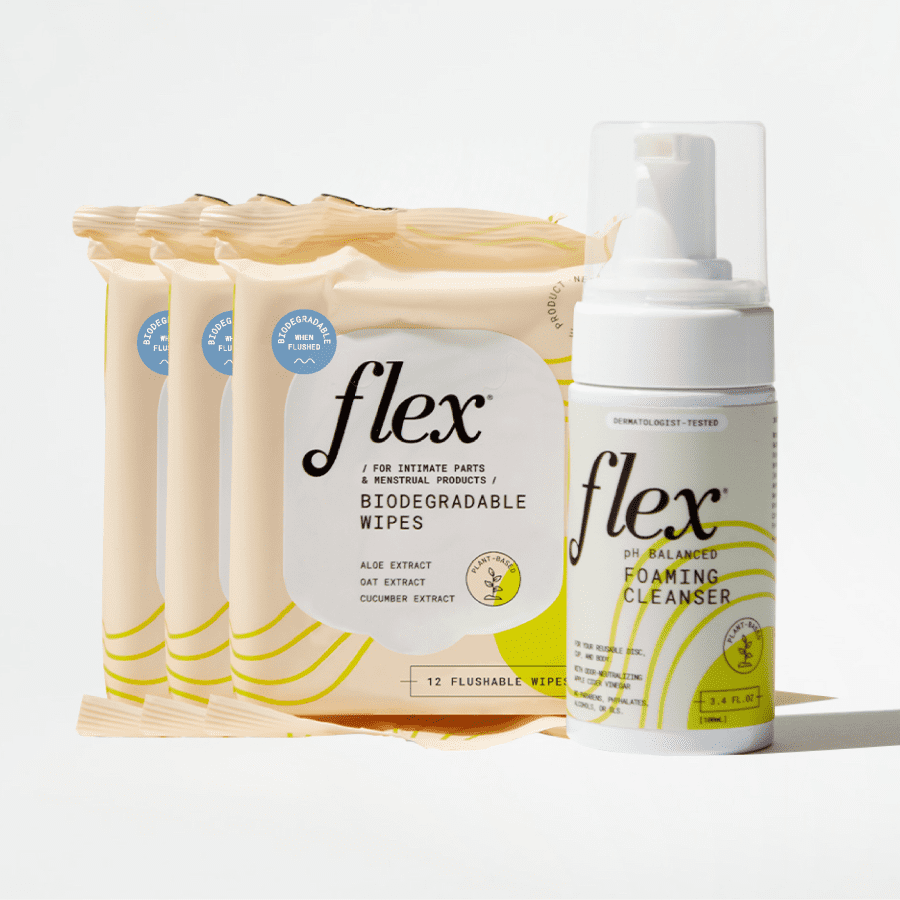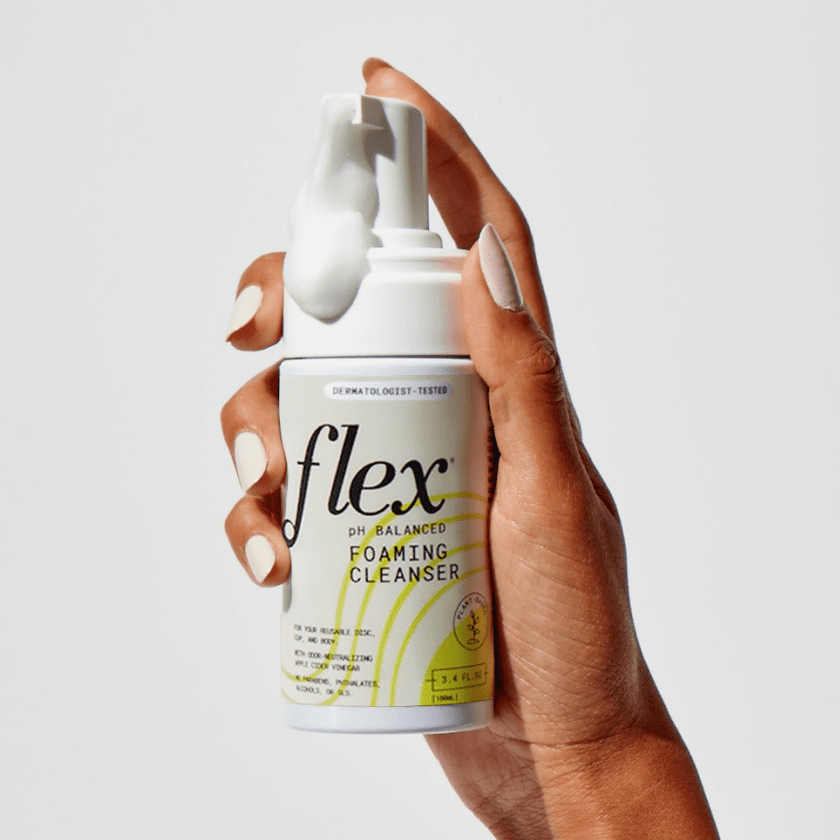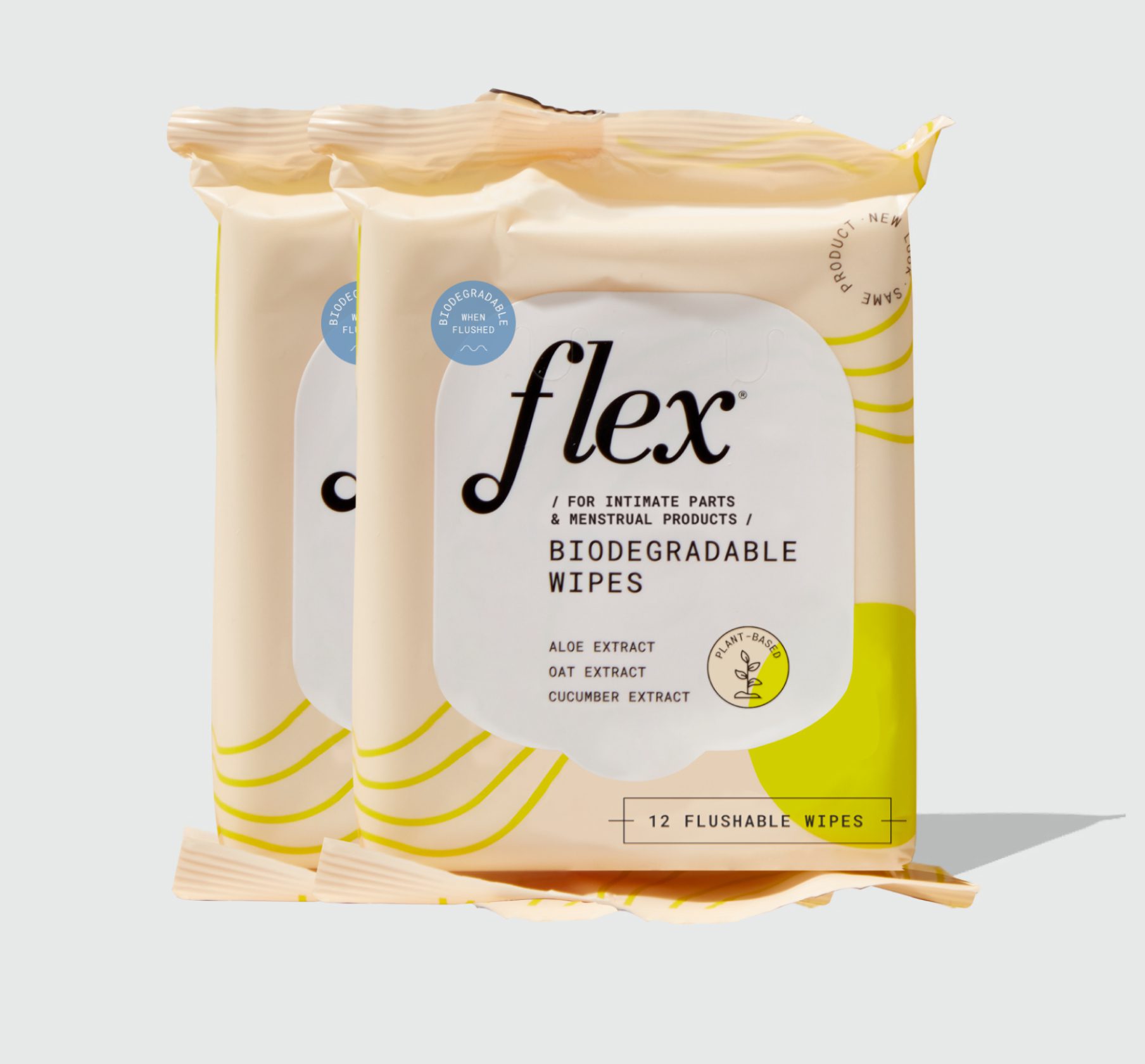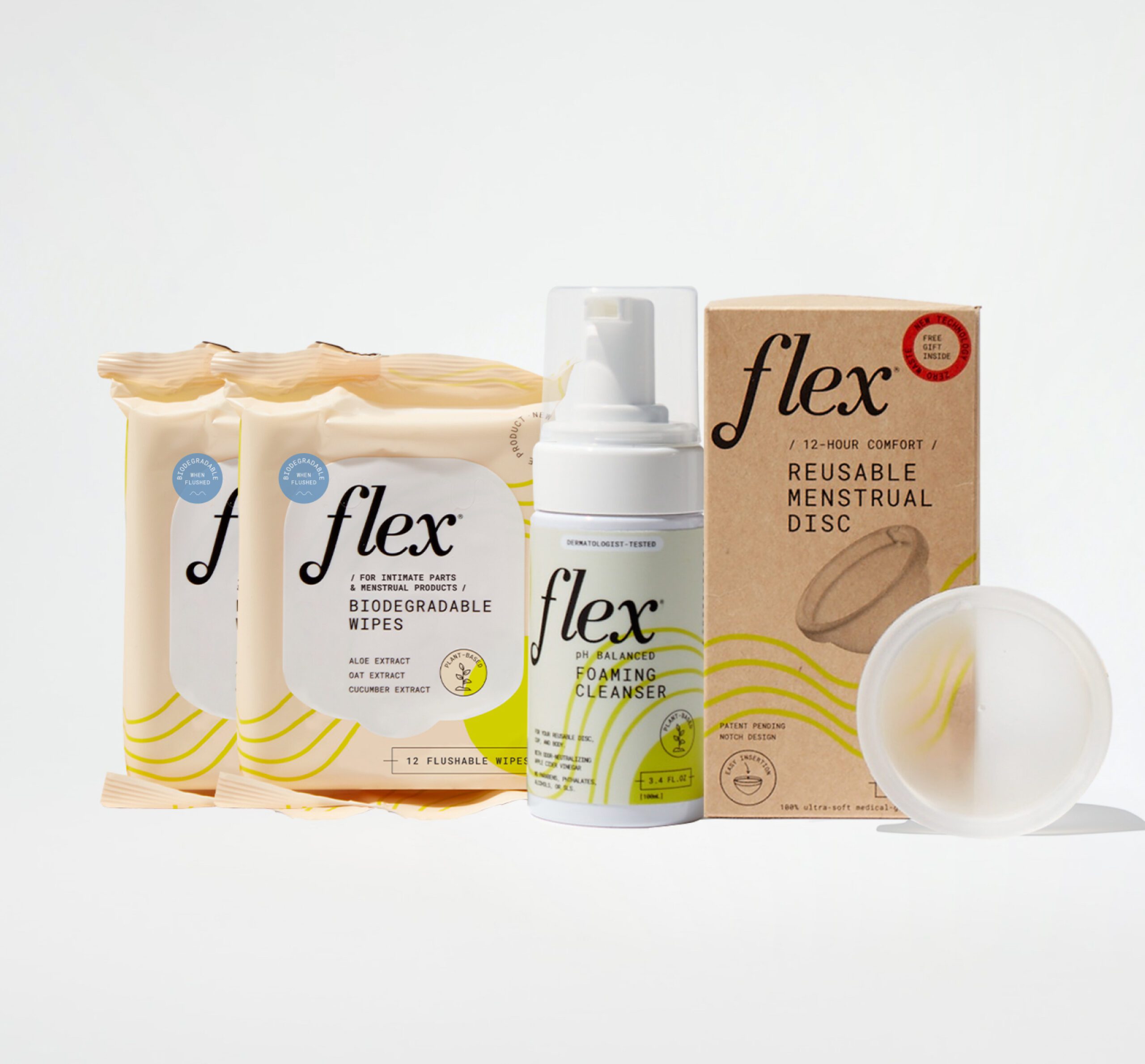How to clean your vagina (spoiler alert: it’s self-cleaning)
Hold the soap—have you ever considered why companies get folks with vulvas to feel embarrassed about their genitals because of normal things like odor or discharge? It’s because vaginal hygiene products are a multibillion-dollar industry.1
By creating a problem (like the unrealistic need to be fresh) and then a solution, vaginal hygiene becomes very profitable. Here’s the thing, though: There’s no problem with your vagina. You might notice that your scent and discharge change throughout the month—this is totally normal. In the event that there really is something wrong with your vagina, like a bacterial infection, the real solution is to see a doctor and address the root of such unpleasant vaginal odor. And to avoid those floral-scented, pink-tinted douches at all costs.
Medical providers have known that there’s no need for vaginal hygiene products for years.1 Marketing that causes people with vulvas to feel shame about their parts, and that turns that shame into profit, is misogyny in action.
For the most part, vaginal hygiene products, like deodorants, douches, sprays, and powders, are completely unnecessary. There are a few innocent products that, when used correctly, won’t cause any harm—and we’ll go over those in a moment. But if you’ve got a Groupon in your cart for a vaginal steam, read on to learn why you might reconsider.
Why you don’t actually have to clean inside your vagina
The vagina is self-cleaning. What does that mean? You don’t have to do a thing about the cleanliness of a vagina; it takes good care of itself, by itself. The vagina has natural and delicate flora that you don’t want to disturb, which soap might do.
Let’s pause for a moment to revisit basic vaginal anatomy. We often misuse the word ‘vagina,’ transforming it into a catch-all term to describe the entire genital region of someone AFABAFAB stands for “assigned female at birth.”. ‘Vagina’ in actuality only refers to the internal structure, AKA “the muscular tube leading from the external genitalia to the cervix of the uterus.”2
So, to be totally clear, the vagina is self-cleaning. The vulva, which comprises the labia majora, labia minora, and the vestibule of the vagina, is not self-cleaning. But that doesn’t mean the vulva should be cleaned the same way you would clean the rest of your body. More on that in a bit.
But, again, the internal structure that is the vagina most definitely should not be cleaned like the rest of your body. It doesn’t need to be cleaned at all. Unfortunately, money and shame have historically overshadowed science. Especially back in the mid-19th century—which is when douching and douche products made their commercial debut.
Nowadays, we know better: One study published in Obstetrics and Gynecology examined vulva-owners and the risk of bacterial vaginosis (BV) and candidiasis (yeast infections) with intravaginal practices like washing inside the vagina.3 The study found that these practices disturb vaginal pH, leading to an increased risk of infection.
“Soaps, detergents, and antiseptics used to wash inside the vagina can cause chemical damage and increase vaginal pH, encouraging the growth of organisms associated with bacterial vaginosis.” 3
Bacterial vaginosis itself tends to create unpleasant symptoms like itching, burning, and a foul or fishy odor. So, by douching or using another type of vaginal hygiene product for internal ‘cleanliness,’ you might see the exact opposite of your intended outcome—whether BV or a yeast infection. Again, these products were not invented by medical professionals but by a system of oppression.
Evidence suggests that disturbances in vaginal microbiota “may negatively affect the growth of healthy good bacteria, impacting the vaginal natural pH balance, and alter the vaginal immune barrier.”1
Infections like BV may seem common and fairly harmless at the outset but, left untreated, they can have severe consequences. BV—as well as certain STIs—can evolve into pelvic inflammatory disease (PID), which in turn can lead to infertility, abscesses, or chronic pain. Not something you want to take lightly. 4
Half of the people in the above-mentioned study reported some type of intravaginal washing. Authors call for further investigation into the reasoning and rationale behind intravaginal washing, which we’ll get to next.
Breaking the stigma of a “dirty vagina”
Your vagina isn’t supposed to smell like flowers, perfume, or fresh morning rain. It’s a body part.
Vulva-owners’ bodies are pathologized—even vaginas themselves have historically been portrayed as disease-causing. Even though we know that male genitals can spread diseases, too, these parts aren’t as widely stigmatized.
Cultural construction of vaginas makes them out to be shameful and portrays them as “smelly, dirty, and leaky.”1
A team of feminist researchers sought to connect why folks with vulvas might use vaginal hygiene products, exploring how society has internalized these stereotypes. They call on readers to question the marketing around these products, often leaning heavily on words like “clean” or “fresh” which imply there’s something that needs to be fixed.
Layered on top of the centuries-old stigma surrounding vaginas is the equally archaic and oppressive set of beauty standards that many folks with vulvas have been surrounded by since childhood. These standards condition us to feel a need for constant improvement, whether it’s styling our hair to be straighter or shinier, hiding cellulite or stretch marks, or ripping out ‘undesirable’ body hair.
They’ve extended to our genitals, too: We’re expected to smell like “a meadow of lilacs” or told that the ideal is to have “smooth vaginas with no visible labia minora.”1 Again, unrealistic.
One participant in the study reported that they use vaginal hygiene products because of a fear of vaginal discharge and feeling that discharge should not happen. “I don’t think there should be any discharge 90, you know, 99% of the time,” she proclaimed.
Vaginal discharge is, in fact, healthy. There’s nothing that can be done to “stop” discharge from happening: It’s your cervical mucus. It’s not all that different from the natural and healthy mucus in your nasal passages that protects your respiratory system. The difference is that (in all likelihood) no one has ever been shamed for blowing their nose.
“Normal” vaginas are diverse. Your vagina is supposed to smell like just that—a vagina.
Cleaning your vulva versus vagina (and knowing the difference)
One more time for clarification: The vulva is external; the vagina is internal. Cleaning your vagina, as we’ve established, is a no. Cleaning your vulva? Yep. Here’s why:
“The vulva is the first line of defense to protect the genital tract from infection. Contaminants often collect in the vulvar folds, and increased moisture, sweating, mensesAnother term for menstrual flow (commonly known as your period)., and hormonal fluctuations influence vulvar microbial growth and species balance, potentially resulting in odor and vulvovaginal infection.”5
The odor mentioned here is usually that sweaty smell we’re all familiar with, especially after a long day of work or school, especially in warmer weather. Bacteria from the anus and can also contribute. Even if you’re perfectly hygienic when using the toilet, it’s not difficult for bacteria to migrate from back to front, so washing the vulva regularly can prevent irritation and help keep unpleasant smells, vaginal or urinary tract infections (UTIs) at bay.
Remember: When you’re cleaning your vulva, be gentle. The skin in the genital region is much more sensitive than skin elsewhere on your body. Here’s how to pick the right cleanser and properly wash your vulva without throwing off your vaginal pH:
How to pick a gentle, safe cleanser
Using any old soap or body wash on your vulva? You might be doing more harm than good. Because of the proximity to the vaginal canal and region’s sensitive skin, you’re best off cleaning your vulva with something that’s specially formulated for genital use.
“Since harsh soaps may irritate the vulvar skin and mucous membranes and provoke or exacerbate vulvar dermatitis, feminine wash products should be formulated and tested specifically for the vulvar area to ensure that they do not cause skin irritation or sensitization.”5
In one study, researchers worked with a group of participants who used products containing natural plant extracts to clean their vulvas for one month. At the study’s completion, they saw an overall reduction in vaginal pH—which is a good thing. Lower vaginal pH means more acidity, and acidity (to oversimplify) is what helps the vagina protect the rest of the reproductive tract from infection.
This study highlights the importance of using properly designed and tested products with key attributes including “hypoallergenic, soap-free, pH friendly, mild cleanser, no irritants, protection against dryness, maintain balanced microflora.”5
As always, check your products for clean and safe ingredients. Products that say “pH-balanced” on the label are often a safer bet (as long as they don’t contain harmful ingredients like synthetic fragrances or perfumes, SLS, parabens, or phthalates). Look for a gentle liquid cleanser with a pH level of 4.2 to 5.6. 5 Other good phrases to see on the packaging include “Ob/Gyn-recommended” or “dermatologist tested.”
Flex offers a gentle foaming cleanser that fits the bill: Designed to be used on your body, intimate parts, and on silicone menstrual cups, Flex Foaming Cleanser is made with natural plant extracts and without any of the bad stuff we mentioned above. It’s hypoallergenic, pH-balanced, and endorsed by a team of medical advisors.


How to wash your vagina vulva: The step-by-step guide
Ready to jump in the shower? Here’s how to gently clean your vulva without irritating your skin or throwing off your vaginal pH:
- Make sure your hands are clean, first.
- Start with a preliminary rinse with warm water. A handheld shower head is helpful, if you have one. If not, use your hands to cup water over the entire vulvar region. Make sure to rinse front and back (don’t ignore your behind—it’s home to more bacteria).
- Apply a dime-sized amount of hypoallergenic liquid or foaming wash into your palms. Rub your palms together to create a lather.
- Apply to your vulva, gently cleansing between and around the labial folds. You can use it to clean the anal region, too. Use your hands—not a sponge, washcloth, or scrubber.
- Be extra careful not to apply cleanser to the vaginal opening (vestibule). If you think you’ve accidentally gotten any soap or cleanser inside the vagina, do your best to rinse it out ASAP.
- Rinse thoroughly, making sure no traces of cleanser are left behind. Be sure to rinse in between the labial folds.
- Gently pat the external area dry with a towel.
Keeping your vulva clean on your period
Your vaginal pH levels fluctuate throughout the menstrual cycle, and especially around your period. Did you know that blood has a higher pH than your vagina’s ideal level? Blood has a pH of about 7, whereas the vagina is happiest at a pH of 3.8 to 4.5. The introduction of blood to the vaginal canal will typically increase pH levels slightly during menstruation, which has an impact on vaginal odor—as does the iron in blood itself.
So, if you notice that your odor is different around your period, remember that this is normal. If it bothers you, however, there are a few tips you can employ to neutralize any vagina smells:
1. Switch from tampons and pads to a biologically inert period product like a menstrual disc or cup. Tampons and pads are made with porous materials (usually cotton). Porous materials have microscopic holes that trap odor-causing bacteria, making them more likely to exacerbate any preexisting period smells.
A menstrual cup or disc, on the other hand, is made with either silicone or a polymer, neither of which are porous. In addition, both cups and discs do a better job of sealing in period blood internally—and a better seal = less odor.
2. Keep a pack of pH-balanced wipes in your bag for quick, easy cleaning whenever you use the bathroom. Make sure the wipes you choose are gentle on the vulva. Flex Wipes are a solid choice: They meet the above criteria, contain no synthetic fragrances, they’re dermatologist-tested, and they’re plant-based.
3. If you’re a fan of period underwear, make sure to change them frequently. Yeast and bacteria thrive in warm, moist environments—exactly the kind of environment that period underwear tends to create. If you have a heavier flow, keep a backup pair of period undies on hand and change after about 4-6 hours, or whenever they feel noticeably damp. Same goes for reusable pads.
4. Consider investing in a bidet for hands-free hygiene during your period and throughout the rest of the month. There are plenty of affordable models on the market today (and many are easy to install, too).
In general, your vagina will be healthiest and feel the cleanest when you wear breathable, cotton underwear—period or not. Airflow is a good thing!


PSA: Douching is dangerous
Think douching might be the cure for vaginal “cleanliness”? One study looked at the correlation between douching and talcum powder use and the risk of cervical cancer and found “a positive and statistically significant association between douching and incident cervical cancer.” 6
The study also found that douching may affect susceptibility or response to HPV, a known cause of cervical cancer. How? It has to do with “The dispersal of foreign pathogens or chemical disruptions to the vaginal microbiome, both of which could alter immune response and thereby facilitate tumor development.”6
An additional 2020 study published in the Journal of the Turkish-German Gynecological Association on the effects of douching on microflora and genital infection found that “douching might increase susceptibility to STIs, pelvic inflammatory disease, endometriosis, BV, and other common vaginal infections because it upsets the flora.”7
If that’s not enough to keep your bathroom shelves clear of any douching products, we don’t know what is. Don’t do it! Your vagina is meant to smell like a vagina. If you’re noticing fishy or seriously foul vaginal odor, be sure to see a healthcare provider to address any possible underlying problems.
How does the body naturally maintain vaginal health without extensive cleaning?
The vagina has a self-cleaning mechanism that maintains its health through natural secretions. These fluids help balance pH levels and eliminate harmful bacteria. Additionally, the body’s beneficial bacteria, known as lactobacilli, work to protect against infections, making extensive cleaning unnecessary for maintaining vaginal health.
How to clean your vagina: Key takeaways
- Use of vaginal hygiene products like douches, perfumes, and powders could increase your vulnerability to STIs, BV, and yeast infections by altering your vaginal pH.
- If you’re experiencing symptoms such as itching, burning, pain, and/or an obviously foul, fishy vaginal odor, see a healthcare provider.
- Please don’t wash inside your vagina. It’s self-cleaning!
- You can, however, wash your vulva. Just make sure to choose a gentle, pH-balanced cleanser.
- Douching can increase risk of cervical cancer—so don’t do it.
- There’s no such thing as an odorless vulva; yours is perfectly normal just the way it is.
This article is informational only and is not offered as medical advice, nor does it substitute for a consultation with your physician. If you have any gynecological/medical concerns or conditions, please consult your physician.
© 2025 The Flex Company. All Rights Reserved.
- Jenkins, A. L., Crann, S. E., Money, D. M., & O’Doherty, K. C. (2017). “Clean and fresh”: Understanding women’s use of vaginal hygiene products. Sex Roles, 78(9-10), 697-709. https://doi.org/10.1007/s11199-017-0824-1[↩][↩][↩][↩][↩]
- VAGINA English definition and meaning. (n.d.). Lexico Dictionaries. https://www.lexico.com/en/definition/vagina[↩]
- Brown, J. M., Hess, K. L., Brown, S., Murphy, C., Waldman, A. L., & Hezareh, M. (2013). Intravaginal practices and risk of bacterial vaginosis and candidiasis infection among a cohort of women in the United States. Obstetrics & Gynecology, 121(4), 773-780. https://doi.org/10.1097/aog.0b013e31828786f8[↩][↩]
- Pelvic inflammatory disease (PID) – Symptoms and causes. (2020, April 23). Mayo Clinic. https://www.mayoclinic.org/diseases-conditions/pelvic-inflammatory-disease/symptoms-causes/syc-20352594[↩]
- Chen, Y., Bruning, E., Rubino, J., & Eder, S. E. (2017). Role of female intimate hygiene in vulvovaginal health: Global hygiene practices and product usage. Women’s health (London, England), 13(3), 58–67. https://doi.org/10.1177/1745505717731011[↩][↩][↩][↩]
- O’Brien, K. M., Weinberg, C. R., D’Aloisio, A. A., Moore, K. R., & Sandler, D. P. (2021). The association between douching, genital talc use, and the risk of prevalent and incident cervical cancer. Scientific Reports, 11(1). https://doi.org/10.1038/s41598-021-94447-3[↩][↩]
- Yıldırım, R., Vural, G., & Koçoğlu, E. (2020). Effect of vaginal douching on vaginal flora and genital infection. Journal of the Turkish German Gynecological Association, 21(1), 29–34. https://doi.org/10.4274/jtgga.galenos.2019.2018.0133[↩]






